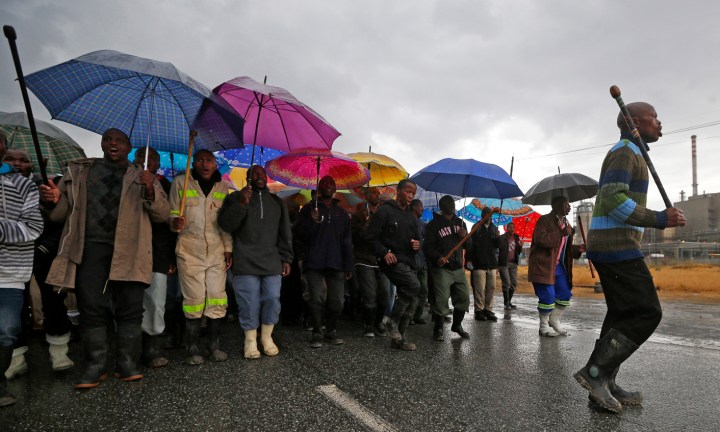South Africa
The all-important right of assembly

It’s getting harder to stage a protest in South Africa. With fear in his heart, GREG NICOLSON remembers some of the regimes that denied its citizens the right of assembly. South Africa is far from China or Cuba, but denying rights is a slippery slope we don’t want to start scrambling down.
When Alexis de Tocqueville visited America in the 19th century and wrote his epic on democracy, he was particularly impressed with the American principles of association and assembly. People met and shared ideas with energy unmatched by written language. They demonstrated to challenge the power of the majority and find avenues to win over the people.
Those principles are now pillars of democracy. They were at the heart of America’s most important movements – abolitionism, women’s suffrage and the Civil Rights movement.
But the right to assemble, the public face of the right to association, has been denied by oppressive governments and dictators the world over. From the moment it took power, the Chinese Communist Party made opposition protest almost impossible. Mao Zedong’s policies of land reform, the Campaign to Suppress Counter-revolutionaries, the Great Leap Forward and the Cultural Revolution killed hundreds of thousands who might oppose him, starved and impoverished many more and left others to rot in labour camps.
The Chinese government continued to label protests anti-revolutionary after Mao’s death, and in 1989 inflamed a popular, democratic demonstration by enforcing martial law and causing the Tiananmen Square Massacre. It’s gone down in history to show the extent the government will take to crush challenges, but citizens still haven’t achieved the right to assembly. The 2008 Beijing Olympics saw China relentlessly hide internal dissent from the world’s media. In July this year, two people from mainland China were sentenced to a labour camp for attending a march in Hong Kong.
“People presenting grievances in China can fare poorly at the hands of the authorities. Most often the petitioners are simply ignored or turned away by local officials, although some decide to press their complaints in Beijing. That ups the ante, as it were, and the resulting punishments can be harsh,” The New York Times reported in July. “They are often tucked away in the rough-and-tumble sections of the city’s south side, hidden beneath dingy hotels and guarded by men in dark coats. Known as ‘black houses,’ they are unofficial jails for the pesky hordes of petitioners who flock to the capital seeking justice.”
Likewise, Cuba has continued to oppress political opposition after Raul Castro took over from Fidel in 2008. A legal framework of repression criminalises dissent through crimes such as contempt, insubordination, collaboration with the United States, association and “dangerousness”. The right to associate is not granted to any groups critical of the government, said a Human Rights Watch Report, New Castro, Same Cuba.
“Not only is recognition denied to such groups, but individuals who participate in ‘illicit’ groups, meetings, or demonstrations without state authorization are subject to harassment, discrimination, and even criminal sanctions.” (One wonders, is this really where our doctors should be trained?)
The Cuban government has instituted a state of fear, one in which it can charge those it thinks may stage a protest. One of the subjects of the HRW report attempted to walk across Cuba with signs calling for the respect of human rights. He was charged with “dangerousness” and sentenced to three years in prison. Another gathered signatures to petition for democratic change and was charged with “disobedience to authority”. When he was released from prison he attended banned political meetings, was once more arrested and charged and received three years for “dangerousness”.
The spurious charges and attempts to stifle association and assembly won’t come as a surprise for South Africans. The Apartheid government built on colonial and Union tactics and used pass laws, the Suppression of Communism Act, police intimidation and bogus arrests to stifle political and trade union opposition. Unlike the revolutionaries in China and Cuba, however, once in government the ANC introduced the right to peacefully assemble, picket, demonstrate and petition to the Bill of Rights.
Recent bans on local demonstrations then look like an aberration. Some of them appear to have been stopped due to municipal ineffectiveness. Others, police might claim in the case of the Marikana women’s march, might not have been peaceful. Even de Tocqueville decried such organising: “As the principal aim of these bodies is not to act and not to debate, to fight rather than convince, they are naturally led to adopt an organisation which is not civic and peaceable, but partakes of the habits and maxims of military life.”
It’s likely these demonstrations, however, would not have been dangerous. They came from organised groups who were willing to consult the authorities for approval and shouldn’t be compared to service delivery protests or wildcat strikes.
Examples of dictatorships across history teach us that denying the groups’ rights is dangerous. Citizens have the right to be anxious about political power and policies and peacefully demonstrate as a collective. South Africa is no China and it’s no Cuba. But it looks like the ANC is placing its own anxieties and fears above the rights of others. Once that starts, we’re on a slippery slope towards a society that stifles new ideas, rejects societal progress and leaves power in the hands of the elite. DM
Photo: Striking mineworkers march outside Lonmin’s Marikana mine in North West Province as they await the arrival of freed colleagues, September 6 2012. REUTERS/Mike Hutchings

















 Become an Insider
Become an Insider